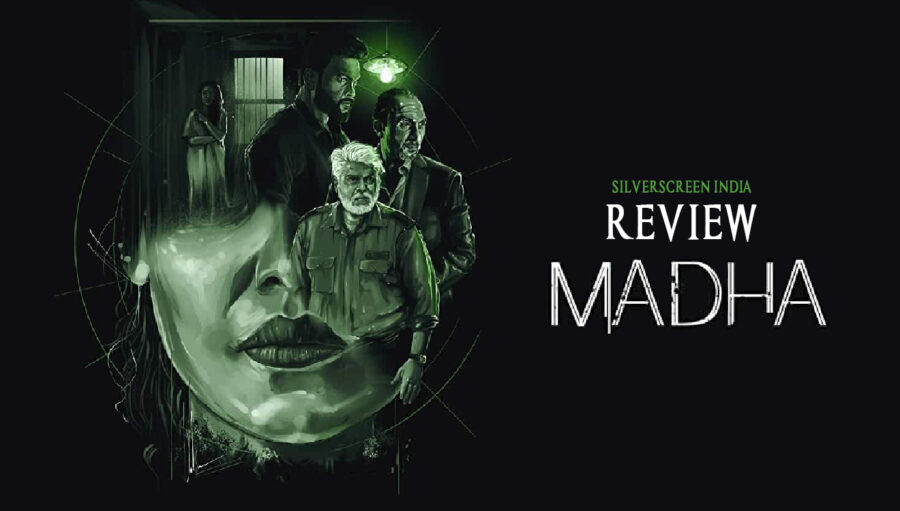Cast: Trishna Mukherjee, Anish Kuruvilla, Venkat Rahul
Director: Srividya Basava
In the opening sequence of Madha, a psychological thriller directed by Srividya Basawa, a psychologist asks students to name what’s the most dangerous thing in the world. When he hears answers like atomic bombs, nuclear weapons, he smiles and says that the most dangerous of them all is the ‘human mind’.
The context of this scene is important because debutant filmmaker, Srividya Basawa, keeps playing around with the idea that our mind is more complex than we can imagine. And as the story of Madha unfolds, we find ourselves questioning how some people use their mind in a diabolical way while others use it to resist, even though they are subjected to extreme torture and emotional abuse.
By the end of the film, it becomes more evident that the effect it creates is more interesting than the story it narrates. Perhaps, it’s got more to do with how one perceives the story and the intent behind it on a subconscious level.
The film follows the journey of a young woman, Nisha (Trishna Mukherjee), who becomes a victim of circumstance. She meets Arjun (Venkat Rahul), an aspiring ad-filmmaker, and the duo fall in love with each other. One day, Arjun tells Nisha that he has to go out of town for a few days for an assignment, and soon after that, Nisha begins to experience a strange set of events in her life that make her friends wonder if she’s mentally stable.
When all her efforts to reach out to Arjun go in vain, Nisha becomes increasingly vulnerable, and before she knows it, she’s branded a ‘mentally challenged person’, who’s a threat to society. She’s forcibly sent to an asylum and subjected to torture against her will, and the rest of the story is about how Nisha deals with the new reality of her life.

In its attempt to maintain an element of mystery and intrigue, Madha deals with a strange predicament. On one hand, it constantly shuffles between three different timelines, which never let you get completely involved in the narrative. In the first half of the film, Nisha’s story is interspersed with a commentary about the human mind; however, the writing is a let down in this segment because there isn’t enough drama or subtext. The monologues of the psychologist in this half are, at best, a distraction. Then, there’s another subplot involving a bunch of scientists, who seem to be conducting some experiments, although it all still seems quite abstract.
But on the other hand, some of the segments, especially those involving the steady decline of Nisha’s mental health are well-handled. And it makes you wonder if that’s the actual story Srividya wanted to narrate. Or did she want us to focus on the stigma that people with mental illnesses face? Or is Madha about something else — about the length which people go to, to fight for what’s right and how the human mind can take a lot more pain than we can fathom?
The film’s redeeming factor, however, is the world it creates and how well the lead actor, Trishna Mukherjee pulls off her character. A significant part of the story is set in an asylum, where patients are often used as scapegoats for clinical trials of new drugs.
Recommended
Some of the best moments of Madha unfold in this asylum. Be it the claustrophobic effect that the walls create or the sheer terror in Trishna’s eyes when she grapples with what she’s being subjected to for no fault of hers, Madha reaches its full potential in this segment of the narrative. The intricately-designed setting itself is brought alive quite well by cinematographer Abhiraj Nair, who doesn’t let you look beyond the trauma that Nisha goes through.
The green palette and lighting have a huge effect on a subconscious level. Naresh Kumaran’s background score accentuates the grim mood of the film. Trishna Mukherjee holds the film together quite well, especially when it comes to emoting the turmoil that she goes through. And it’s her performance that leaves a long-lasting impression.
The good thing about the film is that Srividya Basawa stays true to the subject and delivers some sparkling moments where the lead character is pushed into a corner. However, the film’s ending itself makes you wonder if someone else hijacked the original story because after spending nearly 90 minutes to create something truly original, the film ends like a masala movie where revenge and vengeance become the conflict point. All said and done, for what it’s worth, Madha marks a promising debut for Srividya and Trishna Mukherjee, even when the film itself doesn’t quite hit the mark consistently.
The Madha review is a Silverscreen original article. It was not paid for or commissioned by anyone associated with the film. Silverscreen.in and its writers do not have any commercial relationship with movies that are reviewed on the site.



